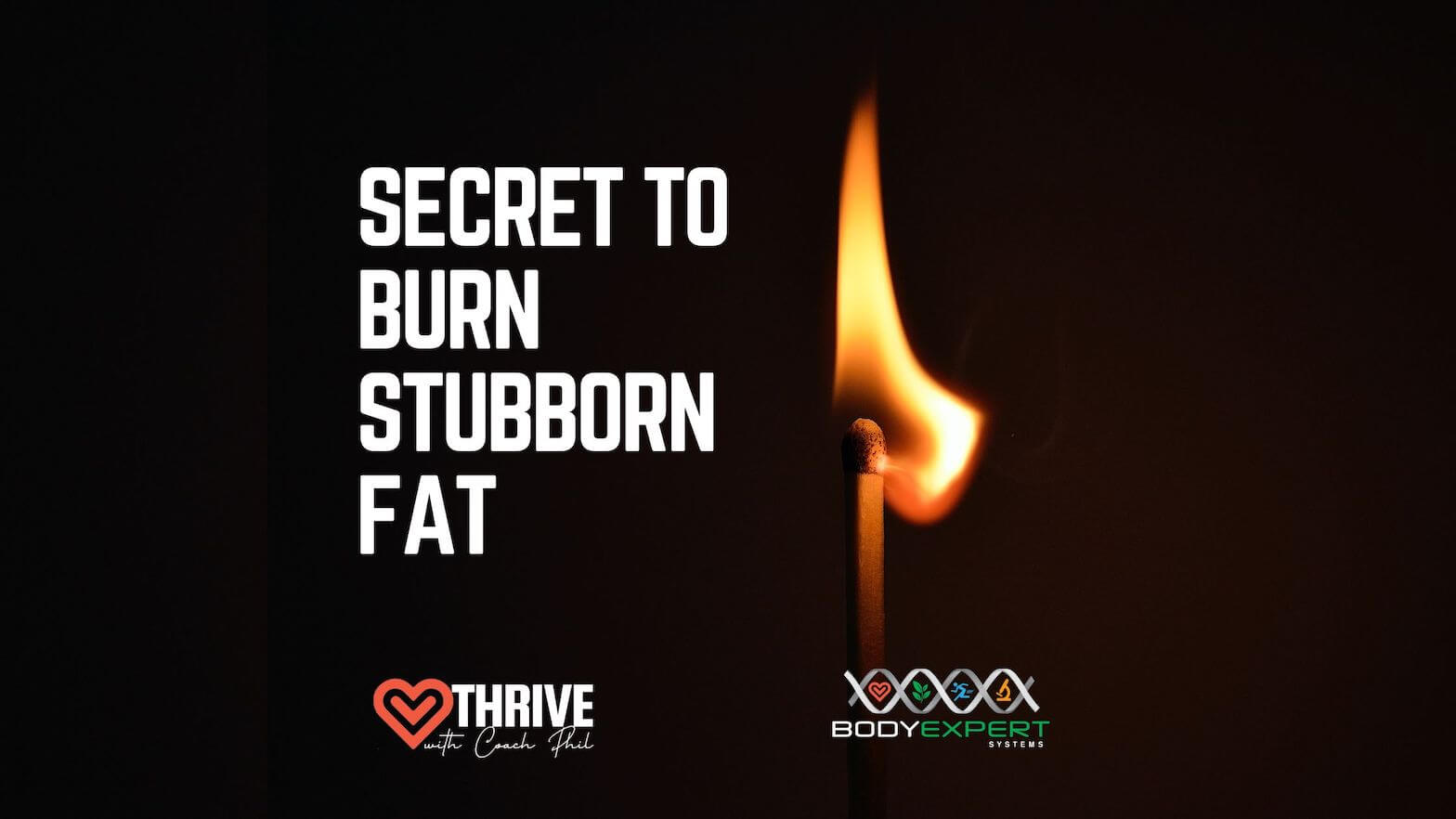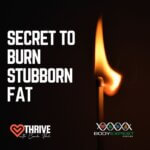Why does fat loss feel harder than it should, even when you’re eating well and training consistently? The answer often lies beyond calories. If you’re struggling to loss weight it’s probably related to the insulin and fat loss challenges, understanding your body’s hormones is key. Insulin – the body’s “storage signal” – plays a major role in how easily you burn fat, regulate energy, and control cravings. When it’s not managed well, fat loss can feel like an uphill battle no matter how disciplined you are.
You’ve started making healthier food choices. You’re mindful of your calorie intake. You’re tracking your food, hitting the gym, and saying no to treats.
You’re following common advice. So why does fat loss still feel like an uphill battle?
Before you jump to blaming your metabolism, or your willpower, there’s a key hormone that deserves your attention. Optimising its function is vital for better fat-burning ability. It’s not testosterone. It’s not cortisol. It’s insulin.
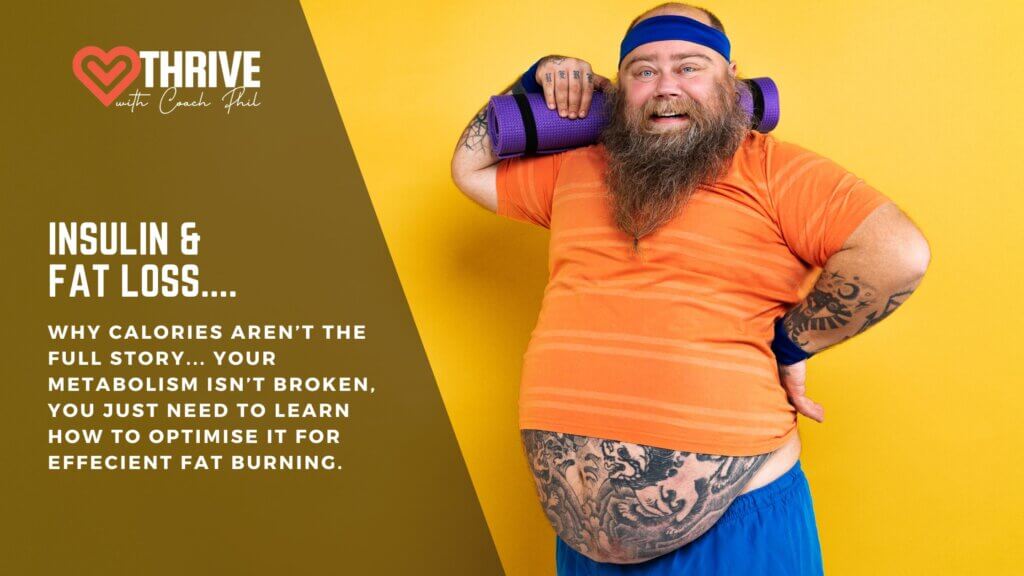
Your Metabolism Isn’t Broken, It’s Just Not Optimised for Efficient Fat Burning
Insulin is a powerful hormone, often called your body’s “storage signal.” When insulin levels are elevated, your body is signalled to store energy, primarily as glycogen in muscles and liver, and as fat in adipose tissue. When insulin levels are lower, your body shifts gears, making it easier to access and burn stored fat for fuel.
However, many common modern habits, such as frequent eating (especially of refined carbohydrates), chronic stress, and insufficient sleep, can lead to consistently elevated insulin levels. This sustained elevation can significantly reduce your body’s rate of fat mobilization, keeping it biased towards storage.
You might be in a calorie deficit on paper, but if insulin is consistently high, your body can resist efficiently mobilizing and burning fat. This doesn’t mean fat loss won’t happen, but it can feel significantly slower and more frustrating, as your body isn’t easily accessing its fat stores for energy. This impacts your overall ease of losing fat.

Do Calories Still Matter?
Yes. Always.
A calorie deficit, consuming fewer calories than your body expends, is fundamentally necessary for fat loss. However, how efficiently your body responds to and utilizes those calories is profoundly influenced by your hormones, particularly insulin.
It’s about putting all the pieces together… Every aspect of your life has a hormonal response and impact on your internal environment and must be considered equally as important as diet and exercise.
When insulin levels remain elevated, your body prioritises glucose utilisation and storage, making it harder to tap into fat reserves. This can indeed make fat loss feel slower or more challenging, even if you are eating less, because your fat-burning ability is compromised.
Improving your body’s insulin sensitivity doesn’t replace the need for a calorie deficit, it simply makes that deficit more effective and the process of fat loss feel more natural, with less hunger and more energy, boosting your metabolic flexibility.
So What Might Be Going On?
If you feel like fat loss isn’t progressing, no matter how hard you try, some of these experiences might resonate:
- You feel a significant energy slump after meals
- You experience persistent sugar cravings, even when you’re physically full
- You find yourself snacking frequently throughout the day
- You tend to store fat predominantly around your belly (visceral fat)
- You feel mentally foggy or have difficulty concentrating in the afternoons
These can be indicators that your metabolism is biased towards “storage mode,” hindering efficient fat burning.
6 Habits That Can Keep Insulin High
Even if your diet appears “clean” on the surface, seemingly “healthy” options like granola bars or oat milk lattes, if consumed frequently, can keep insulin levels elevated throughout the day, hurting your metabolic flexibility.
These habits can contribute to elevated insulin levels, reducing your fat-burning ability:
1 – Eating frequently: Especially consuming carb-heavy meals or snacks often can keep insulin levels elevated for longer portions of the day, limiting your body’s natural fat-burning windows.
2 – Starting the day with refined carbs: Cereal, toast, pastries, or fruit juice can cause rapid blood sugar spikes, leading to a significant insulin surge early in the day
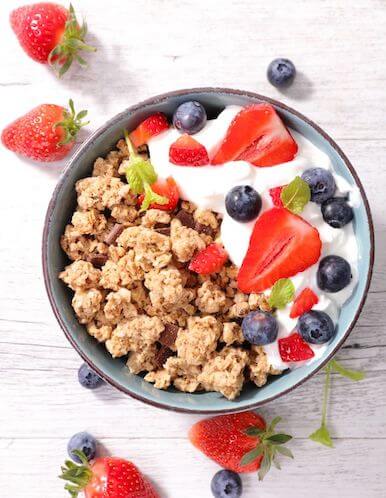

3 – Drinking carb-heavy smoothies: Even if made with healthy ingredients, blending foods can lead to quicker sugar absorption and a higher insulin response compared to eating whole, fibrous foods.
4 – Sleeping less than 7 hours: Chronic sleep deprivation significantly impairs insulin sensitivity, leading to higher blood sugar and insulin levels.
5 – Inconsistent strength training: Muscle is a primary site for glucose uptake. Skipping strength training reduces your body’s capacity to efficiently manage glucose, impacting insulin sensitivity.
6 – Living with chronic low-grade stress: Persistent stress elevates cortisol, which can increase blood glucose and, consequently, insulin levels over time, contributing to insulin resistance.

How to Optimise Insulin Response and Boost Your Fat-Burning Ability
The good news is that you have significant control over your insulin response. Here’s how to encourage your body to shift towards burning fat more readily and with greater efficiency:
1 – Reduce Refined Carbohydrates: Focus on cutting out processed breads, pastas, sugary drinks, and packaged snack foods. Instead, prioritize whole, unprocessed carbohydrates like non-starchy vegetables, potatoes, whole fruits, and true whole grains like oats (in moderation, especially if metabolically compromised).
2 – Build Meals Around Protein and Healthy Fats: Including sufficient protein and healthy fats in your meals helps stabilise blood sugar, minimises insulin spikes, and promotes satiety, which can naturally reduce overall calorie intake and support stable blood sugar.
3 – Create Space Between Meals (Minimise Snacking): Aim for three solid meals with several hours in between. This allows insulin levels to drop between meals, giving your body the opportunity to access and burn stored fat more effectively.
4 – Walk After Meals: Even a brisk 10-15 minute walk after eating can significantly improve post-meal blood sugar control and enhance your body’s sensitivity to insulin.
5 – Strength Train Consistently: Regular strength training builds muscle mass. More muscle improves insulin sensitivity, making your body more efficient at utilising glucose and reducing its reliance on fat storage for excess energy. This directly impacts your rate of fat mobilisation.
6 – Prioritise Quality Sleep: Adequate sleep is crucial for hormonal balance. Poor sleep directly contributes to increased insulin resistance and stress hormones. Prioritising sleep will positively impact your insulin response and overall fat-burning ability.
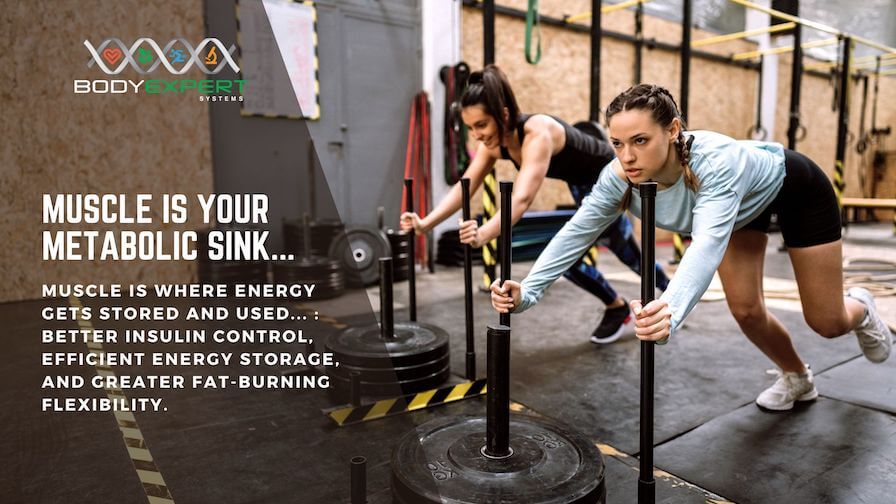
The Fix Isn’t Flashy, but It Works
You don’t necessarily need to severely restrict calories or engage in endless cardio. You need a body that is optimised to work with you, not against you, making fat loss more effective.
Once your insulin response improves, the fat loss journey can feel remarkably different. You will experience less persistent hunger. You will have more consistent energy levels. And you’ll likely see more tangible results, without the grind, thanks to improved metabolic flexibility.
Bottom Line
If you’ve felt stuck in your fat loss journey, experiencing persistent hunger or frustration even with diligent effort, insulin resistance might be making everything harder than it needs to be, directly impacting your ease of losing fat.
Calories still matter profoundly for fat loss. But how your body responds to and manages those calories, driven by hormones like insulin, matters just as much for effective, sustainable, and truly efficient fat loss
Join us at our Body Expert Studio in Saigon or CLUB THRIVE Online to get the expert support, nutrition coaching, and exercise programs to optimise your energy, focus, fat loss and performance.
Whether you’re based in Saigon or anywhere worldwide – we’ve got you.
Additional Blog Articles:
Checkout some of our previous articles on insulin and fat loss:
1 – Saigon Fat Loss Experts: Is Your Fat Burning Switch Turned On?
2 – Body Fat & Weight Loss Specialist in Saigon: Understand How Fat Talks
3 – Saigon Wellness – Part 2: Can Fasting Save Your Life?
Connect with us:
We are here to help you make the best choices to #LIVEBETTER and THRIVE. Improve your quality of live by developing boundless energy, upgrading your brain, optimising your body and defy aging… for more information checkout our THRIVE Saigon Memberships – click here!
If you’re not in Saigon / Ho Chi Minh City, Vietnam but would still like us to help you improve your quality of life and live better GET IN TOUCH WITH US NOW or checkout our award winning Online Coaching Service: CLUB THRIVE.
For more great information, inspiration and tips on all things health, fat loss, longevity follow me on Instagram @THRIVEwithPhil
Sources and further reading:
Insulin’s Role in Fat Storage and Metabolism: Samuel, V. T., & Shulman, G. I. (2016). Mechanisms of Insulin Action and Insulin Resistance. Physiological Reviews, 96(2), 819–853. https://pubmed.ncbi.nlm.nih.gov/30067154/
Impact of Refined Carbohydrates and Insulin Resistance on Fat Mobilization/Loss: Hall, K. D., et al. (2015). Energy expenditure and body composition changes after a 6-month room-confinement study in humans. The American Journal of Clinical Nutrition, 101(4), 798–806. https://pubmed.ncbi.nlm.nih.gov/27385608/
Post-Meal Walking for Blood Sugar and Insulin Sensitivity: Reynolds, A. N., et al. (2023). After Dinner Rest a While, After Supper Walk a Mile? A Systematic Review with Meta-analysis on the Acute Postprandial Glycemic Response to Exercise Before and After Meal Ingestion in Healthy Subjects and Patients with Impaired Glucose Tolerance. Sports Medicine – Open, 9(1), 19. https://pubmed.ncbi.nlm.nih.gov/36715875/
Strength Training and Insulin Sensitivity: Holten, M. K., et al. (2004). Strength training increases insulin-mediated glucose uptake, GLUT4 content, and insulin signaling in skeletal muscle in patients with type 2 diabetes. Diabetes, 53(2), 294-300. https://pubmed.ncbi.nlm.nih.gov/14747278/
Sleep Deprivation and Insulin Resistance: Donga, E., et al. (2010). A single night of partial sleep deprivation induces insulin resistance in multiple metabolic pathways in healthy subjects. The Journal of Clinical Endocrinology & Metabolism, 95(6), 2963–2968. https://pubmed.ncbi.nlm.nih.gov/20371664/ Martins FO, Conde SV. Impact of Diet Composition on Insulin Resistance. Nutrients. 2022 Sep 9;14(18):3716. doi: 10.3390/nu14183716. PMID: 36145093; PMCID: PMC9505491. https://pmc.ncbi.nlm.nih.gov/articles/PMC9505491/


